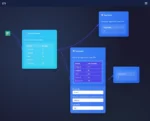In the world of computing, speed is a coveted attribute. The ability to process vast amounts of data quickly and efficiently has been a driving force behind technological advancements. Classical computers have come a long way in terms of processing power, but there are still limits to their capabilities when faced with complex problems that require massive computational resources. However, a new player has entered the arena, promising to revolutionize the speed at which computations can be performed: quantum computing.
Harnessing the Unique Properties of Qubits
At the heart of quantum computing lies the qubit, the fundamental building block of quantum information. Unlike classical bits, which can represent either a 0 or a 1, qubits can exist in a superposition of both states simultaneously. This property enables quantum computers to perform computations on a vastly larger scale than their classical counterparts. Furthermore, qubits can also exhibit a phenomenon called entanglement, where the states of multiple qubits become intrinsically linked. This property allows for simultaneous manipulation and measurement of multiple qubits, exponentially increasing computational power.
Exponential Speedup: Solving Complex Problems in Minutes, Not Centuries
The unparalleled processing speed of quantum computing is best exemplified by the exponential speedup it offers for solving complex problems. Certain computational tasks that would take classical computers years, decades, or even centuries to complete can be tackled by quantum computers in a matter of seconds or minutes. This transformative leap in processing speed opens up a world of possibilities for solving a wide range of problems across various domains.
Complex Optimization: Optimization problems, which involve finding the best solution among a vast number of possible options, are prevalent in fields such as logistics, finance, and operations research. Quantum computing’s ability to explore multiple solutions simultaneously through superposition and entanglement can significantly expedite the optimization process. This has implications for supply chain management, portfolio optimization, resource allocation, and other complex decision-making scenarios.
Simulation and Modeling: Quantum computers excel at simulating physical systems, allowing researchers to understand complex phenomena at an unprecedented level of detail. For instance, quantum simulations can provide insights into the behavior of molecules, enabling the development of more efficient drugs and materials. Quantum computing’s ability to simulate quantum systems, such as chemical reactions and quantum mechanical interactions, holds promise for advancements in chemistry, physics, and material science.
Cryptography: Quantum computing also poses a significant challenge to classical cryptographic systems. Shor’s algorithm, a quantum algorithm, can efficiently factorize large numbers, rendering traditional encryption methods vulnerable. However, quantum computing can also offer solutions to secure communication through quantum key distribution (QKD) protocols. This exciting field explores the use of quantum properties to enable secure transmission of cryptographic keys, ensuring confidentiality and integrity in the era of quantum computers.
Unlocking New Frontiers: From Research to Real-World Impact
The breakthrough in processing speed offered by quantum computing opens up a world of possibilities for tackling previously intractable problems. As the technology matures and quantum hardware becomes more reliable and scalable, we can expect to see quantum algorithms addressing real-world challenges. The impact of quantum computing can be felt across industries, from optimizing supply chains and financial portfolios to advancing drug discovery and materials science.
However, it’s important to note that quantum computing is still in its early stages, and there are challenges to overcome. The delicate nature of qubits requires precise control and protection from environmental noise, making quantum systems prone to errors. Researchers and industry leaders are actively working to improve qubit stability, develop error correction techniques, and scale up quantum computers to harness their full potential.
In conclusion, the unparalleled processing speed of quantum computing, made possible by the unique properties of qubits, holds tremendous promise for solving complex optimization, simulation, and cryptography problems. As the field continues to advance, we can expect to see quantum computing making significant contributions to various domains, driving innovation and reshaping the technological landscape. The future is quantum, and the possibilities are limitless.

























